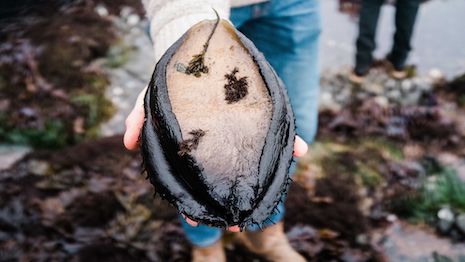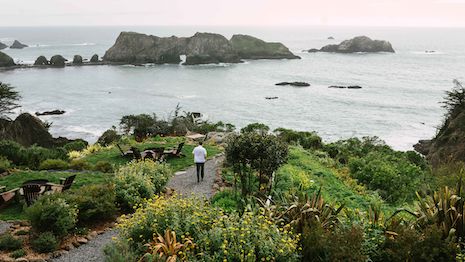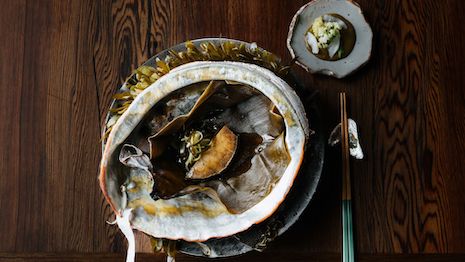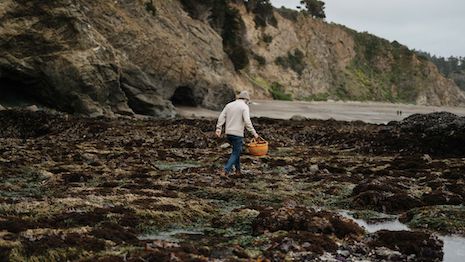French Cognac brand Rémy Martin is teaming up with the Michelin Guide, tapping sustainably-minded chefs in new programming.
Stepping into the world of the locavore movement, Rémy Martin explores the possibilities of local eating with the award-winning chefs leading the way. Together, the culinary figures and the brand discover the ways in which the Cognac compliments the land around them in a pairing series.
"The locavore movement is choosing local and sustainable food over foods that are grown elsewhere and shipped in," said Matthew Kammerer, executive chef at The Harbor House Inn, Elk, California.
"When possible this is a better solution that will reduce your carbon footprint and can have a better nutritional value."
Land-based eating
Delving into the ingredients of California, the Cognac brand asks the chefs to pair the product with creations made from their local flora and fauna.
Chef Matthew Kammerer, recipient of two Michelin stars and a Michelin Green Star, turned to the sea.
Rémy Martin Sustainable Pairing Series x Matthew Kammerer Partnership
Describing his food as “a direct reflection of our surrounding area,” Mr. Kammerer’s cooking is deeply rooted in the local environment – a place defined by rocky shores, seaweed bed, hardy trees and meadows.
When his customers eat his food, they can taste the salty winds and sweetness of the grassy fields. They can taste the woods and seas and ranches.
That is the magic of localized eating – it allows the eater to become a part of the land; to experience their local ecosystems on a more intimate level.
 The brand's highlighting of foraging presents a strong level of dedication to sustainable eating. Image courtesy of The Harbor House Inn and Matt Morris
The brand's highlighting of foraging presents a strong level of dedication to sustainable eating. Image courtesy of The Harbor House Inn and Matt Morris
It is for this reason that the locavore movement became so popular in the first place, as people were wanting to have more meaningful experiences with their food. Not only that, but focusing on local ingredients comes with sustainability benefits, as the carbon footprint is lower and local economies are supported.
With this shift away from standardized meals and the McDonaldization of food came seasonal menus and ingredients that were grown on-site or foraged – all staples of the luxury food world today.
 The locavore movement is a push to put the land on a plate, making for a more engaging eating experience. Image courtesy of The Harbor House Inn and Matt Morris
The locavore movement is a push to put the land on a plate, making for a more engaging eating experience. Image courtesy of The Harbor House Inn and Matt Morris
It is in this spirit that Mr. Kammerer created a roasted Wakame seaweed ice cream to be paired with the Cognac, the chef seeing connections between the balance seen in both the land and drink. Together, the notes of honey in the Cognac and the smoky taste of the oceanic ice cream created a smooth finish, bringing to life the harmonious landscape on the eaters’ palettes.
Rémy Martin also put Sonoma wine country centerstage, hosting a farm-to-table dinner with Chef Kyle Connaughton – a three-time Michelin Star recipient and winner of a Green Star. Like Chef Kammerer, he also brought his local Californian bioregion to the table.
Rémy Martin Sustainable Pairing Series x Dessert
He worked with Rémy Martin executive chef Romuald Feger, turning to the brand’s Tercet and XO Cognac for pairings. The dinner consisted of multiple courses, the tasting menu consisting of ten plates, including duclair duck and jus chestnut cromesqui.
The culinary masters evoked the region’s springtimes, eventually pairing Rémy Martin XO with steamed spongecake topped with apple compote, hay ice cream and miso caramel for dessert.
Sense of place
Many other luxury names are seeing the value of immersive experiences such as pairings and the use of local food.
Using regional ingredients and providing transparency around land-based practices like farming and gardening crafts a sense of place, keeping consumers engaged and invested. It can also be grounding, feeling more personal – something that the emerging Gen Z demographic is especially responsive to.
 Consumers are increasingly wanting more seasonal offerings, as it comes with added levels of sustainability and exclusivity. Image courtesy of The Harbor House Inn and Matt Morris
Consumers are increasingly wanting more seasonal offerings, as it comes with added levels of sustainability and exclusivity. Image courtesy of The Harbor House Inn and Matt Morris
Increasingly, the market is favoring those that share the values of the youth – notably, sustainability and heritage. This makes Rémy Martin’s localized pairings extremely complimentary to the current demand for brands to honor the land and provide deeper viewing experiences in advertising.
LVMH-owned champagne house Ruinart recently showcased its own tethers to its local landscapes, presenting a harvest docuseries (see story).
Establishing brand identity is also an added benefit of incorporating slow food and local flavors into products and campaigns, as it shows where the brand is from. Miami cruiseline Regent Seven Seas is one of the latest luxury names to tap into this power (see story).
{"ct":"3jWzTCEm0cEgYVeabthj9EnSwMRJ6rVPiH3E\/mBlD5eoMPAxbIp2NQe6bH0mQcuWWBa53tjdhWw10SDNzS2LLjYVOHGQFakDjdCAkyhZjUWKqVbHqV2GUKcC6NKItF6COCl6kvy8oxAp8+ITtLy+tJc734HAovBIRbuZ7WUuLhj\/GvaX8SNE\/RZFVH\/souxXYCV6+RfTUJqrc5PhFaVqJaBvBMH6VWyQ4eDyhoQlyVWlIT58fAI+SXhUr9ex\/xfsTEQ3v7RyvFmQxnS3Q7YCYjc76+kyqkqllK4BGbV3q6GUTfEmknnYkspv3ENXQjbpDa8UqGxVQSeZQE\/LNUFhh5\/txVdgVnwGj4uVMrapZ63v\/crsSMg0fGmh7g4OzApmHgcwW2WTQArtHv1PXiQYnyodgXwzz0u9pgl3XME1N1+k86dD\/EGVEkpTlwOWt+bzA4yOMUfOugtBXTKK\/2oW+bZLiGXw2dfyO1DaTnaFgUFAjYBWJ0+ZCwM4uaWvkhPPFd4zTVcpdP2eFusWHRIVBFCg8FH3cOxuMDgzAkCaTHx6aMCODBF7dgD\/TfvCl9dBSuAgyFkG+yroSqeAeOjrbiPw1rHveSNoV\/tjfHA\/ChXPldzWa5hcAF8rJLV2ChuPFrAsOmNQXWF70RLDdc6Ve6yTMMFGrU2SG\/+RRNsBqe6aYXQJJHf7tzhIcJyF9LnopGurvpphd9kt\/4iQvRXBysh1wg6gyuDH+Udws3VlBmfTp1uRPC1onYz0p0aWwveq6SaII+gwAKqW5bPvqgJhIWdPN190ftZ3mMGW2PndaWcXUDAevzEutGoOoyTj4lDeR79yb8N3OpCqw\/LI1qofxEKAMXQrxElBZDRaWIxBdONxYBsdrREMsWRvM8mPp7cgoJVZ\/s4uMhhICBeOjwvhKvmjJnW4Qas32PvUbhz8z8iBRbBzkwp+\/zV\/AVUPzN8O\/Ek537eeTKZ0p3bSIQLkae4k8UzUStYu+3ZRJblZJS5ew+pq5V37Szusv8eqjrGvTn3Ch\/3D76ZJyabLeVy\/kIiCfQUrRyw3kZ9zrFJVexIXFltjRgThhNi0qtjrBqYHzldj1IWk4ryeaTibgUwuPMSGPf1IybgBX5dtDgR7gK0nKySyi1sAjxRKNGub1ho2\/B6P14uQ6NYFMfg3iZBGB0tc9MJBtwSgUBwP\/eH\/qlfDBYwJT\/0PMFxfYkrvRjKLByI3ngja3Ewc5huGFI0Isqw9FguYt9WNBK9kH49t9fgC+YrhBF5cumqC3ktS\/P0coXNOM7cbooX7tPaqbPqbySWutNSNnrYfpoPLDv86s+8ffsRnnGWqWk2slgpEYGRR20ZcY4e6R\/Dt8DwbxTzTyBQ\/M2FKAo+RJokWlGJ3BDmFexrpahRtEuF929dQye1I4G3Bcgt9EjzOzDkfX3xzZb8xrej6mRJpJLKU11\/WA1yPoXXXP6K2EnEFBRm\/MFEZ2juH+9eS7Tsub\/j\/9dxK3EXmTMI2KC6\/aAxXpRbjz0JtQd88ZoG+\/pawHCD0ZQCZqPZNniUVWX7yo+KZTMFUPeimWm4Hq\/Ob8ZfbtKit+8GYeJF9SqjcDptbgQSIqeV1RcZhhQKpnsHRA38mI5ckUT5x3axB44kGz47z2CgEN+f74+BZa4WajEXNOhv\/vEecI+Y90ll9thdtAyCO9sII8ir\/TK3IEH1l\/k7UDVZWLB9nYZS7q+TZ2cX22kT1mGPAl8gzYZX2bCAd+vCTZydyIL2P27\/ve+IzfSh9WuIMvt3ECiC4\/JNlVGVFfK1qN3hBl4nQXu1wxJUZClxjD3ow+LiF8wfbLioRo6i1VX\/p9C409ndYcPJWeqdgKg1iRD5q6adICp2YC6WrOkb2ML9cE5APJlxO8wGryueI0+Gk+niji4\/Q5aT\/c6Yd4\/ScWzkfsrHiQlc6m2zJj80+4aBxil6UDjR0kZfWaJ\/ryXIMhUlMfU3EgvizSMdPFIHKEvEO7em2rxRV2nzYL7w8V3SXfrvOEKWRsOAGaLL9P2EyA5H6WwXcFSojbGA1O7tJnfgroKnQ2N8F2VvowC8BIbsXXNBo34BBVXDpxCOVUG3fXqzeBc0ek2o2WRhJbdxrQjrdWdW0DIH+EiIiKfT4Ftln0RSsMkzHc6\/bwVAjs03cDlPCa5k4XX86uNMmH6Qb+gOeAjY76ZlYIziLknF4z3NsaB8saDiQLRYXLer\/5ZRb9D24cyQg9y7Eo2mNdpI\/9x8P5G672sSbtnHkXALboFmzpc4dDLaiy9o2tsY0N7uxadCu9tRh7os7Drp+rHCEGFwEuss1koahCskBcXK3tPLsP34khUxOk5gomK+NTvPIQxDdyxR87FOwUDSkP2608oxpFeRxT4tzbEdvkbjADPGGES+tP9k3S\/RI5na3jCx5Gkkgdu6thi9m5U7ItYWWas66JFt7Nvanm5ScG3raX+2Z8R7UjMIV\/bQWLItzCL3ao+jPxQRTzQgwquEqRjhmIpgy8Xe0\/vfAmeK5Q+yGZrAo1y1QGi0RM62b2NWBR6t8heqjddN0Da1ar5sh19VelsQxP+yRtQ2NPkoqVOi7TGSy7ntzwsajf2oN\/XJFOpcW\/Pz7teKFrH4fCr6\/8DaT6NLUjxl0AWuiVh8HqLQfs7CowK7teuYjckAkZ+J8cO3zGAHCk9hPjxNmCa9rTL4kRoiYOBv\/4U6B29R8NNRp68IVRXSjYOAq2aKBqMlwoK+ctozgywQ9iuPhoWF4agOFnci3GOqRWfWiuBo4hRq+TsNjMUEhErRPNey4mK2SNZtXnFGqA150Dq3HlLUXHbqDcg9GqE9Oiuugvei+mMbEScuZSd2WQ+76Zi6LktG8\/Ja\/ZGaJ\/MTiOxRVXSJksbWTWvLp\/fuvaI7Rs6Va1PHWv4JTb9cr2u1E0QMty3oNA7MEmbPsNfEgnYjuWinxmYTKGIuzlcMLjTsKEl91y0uidH6PXRWzliMCiYBenu8n2HHgdfTCcnd7xaGFR5PJ6VS4UwQpzeIeEY4VYcBuWEA2Eo15SxpVQ6ecPZuVDNEcf1\/X3dwPYJLztd0jd5tuEQyHrRe70JPdqac\/adUAZi3HtaZ92iw7PpPgOQEmwIfJ1Di278prOEgimAr+OhP+o1yeBQ\/+KhF6J\/Hf4BP45iRgSRmKradP8uwQmq3LWEGIdd76K2d+\/E1\/5lJK7eCNj7CZOvKD2\/kJhrcCuT6Q+QY5MQJPpbX7NLqZKihbj8kG49K2eqwZdIbfA36k91JXj\/D0j1Dh4acCDMYrzplNG\/Y\/rSky4fapKAf1VxEOctt62DW9gyHaep+fOd4y0dmOJYeuIxPcAdhp5CoUFpuDKROzGJmQ8dKeD7E2SxDA81sHwphArrW8df\/X7Eug1XPu+LoGof11mdzzDFD0stbHgT3picOLgHpPhBS90c91WKFUBKLCfG6Lx20fLXZ2BX21vuQ8vfimc+s5VlzFBgEDjCFGg9rFIfTGC6+Og4RW0VwZG+qwukyjqWCyOM6sjxwT+TVBwcx0brV\/JkBufEiYnpYoYybqcxKbUNL+bDKtuM\/pOwhrqldGq+COvV04+n+4reVHf+XoEyujx3W6\/zjB+IEHFkqZDHzJRG+yF0rJn8TB5DrDhA5f+fksqAL9BMS3Tv8svrR6\/8IQ1mL1k3240DkZ0ISPEE+ih5Ns8x+XxjdDVkNjCaCWsvOvr\/tKTwjK+vFHM4e53v9IQZej3ftaTyN4x7895MtwTzUTLbAAsnexpOtNmRr54d+\/VxXfQ8Izl9HuUhc0jWHNVIpiOYLC1kQXknAE+obAaTggnh8u+fm77oIrcTyWRfXKJGv9dLlslWQ0ZO1pr\/ahDQdxSMmLkOsULmsXUMb3HorgxQJhZ2+yrkEQD3v1iyhopOIFDabYZEEsAFiBbJJyuJ0Zjam1P1nfhMYojqXEVfI7TRI3VS7VRVb0hGGuim\/FEXyzSwLfxztki5wXowMNr88Pc2QCKuwWpbAArfHDfMAbEfyTeg9dSLA63ao8aiIVbGK7fAJHo8nGVRCDSUJRr284aZZ24H\/LFxZTG9e1QXNnF9\/cPLnXEhX7mYFDdwUw4ulo\/4j5dXtIi8b5WqR\/jxgsE7Tw1NdAz1dCEKknGT5EC\/OL9gJ71LVXWdOo\/Ya+c2JrT+HzWk4\/b\/EoioCtrP07eHYYF9gIPUzLmhNvloPIBtQeYCWGkf7jC6cqCfAyBQwqTpRVgF\/QzjzBzrmnxEHI0FvixOO02uI+P5+\/JQRDccA2RJZftQ\/Ae443aCuga\/scNJOPFAopH2kY1nUDyQsuYnT8ToWCEpctMzqyaT0qqeJF+AJyheknhf3QFz51Lb9c+qoUWG3Us8RSIKDv440GyKSKqJvb8fSbJ8uUJvdvsCbMGK1tIj9rA15SYEFGB92GlEC9N9pcO0JxFTkNuAIfWi8Zgfbkx0YUWl0gUuhpQS7PBWH34uhUQvb2r1RDPC4mi6eAAPJdnfUggb8iAiKbmgg6cYrdvK0KANh4VaUv2NJkT3x0XirDzouQH1F2mdYev7lkRqduQYsXoEuvAZTaaOXYl41QLiY0hCHFUamuDdvxenOxsAmjKadOcLm1W\/j2IOv9wbX\/sZxUwnTpfPEPbM7hp3RLlxonLDUoy+r89dqiCxwDUryhMU5R4D0hplGuql9xZE1JgyXzJfRuEqqwPD\/Thd7JSIXyr17KLzidpXBTx2kEIl4TCXAm6BkI3JeHNwuGL6h23wWpSv\/4P7mcFH\/WqfontQ\/a2jKRP3Yc22YBAoG3QqVAr7HFfvJZ6vh1hFXtq5LNLhT\/jLkbpZiKTBJEF4+1b6pzcMww3xGr0bcHmXkTMx6xZI5zsYwZj0\/VXSSqhUzZwIFBqj+hvdqh7q6RTcay+bxXN0reaGkbMeQRMOoDlNMzlZ\/6CaZ\/TMiaZFnf5plbey2wrxv4iIAvIGVHrlYQNTB6oMDIZ7A4WXSdeHWZgHvMKvQyZKCbeGNOOUZz8CKG+uOpe7EVL3LTbAS1uWOnLlol\/SI4Io9lv4N584d7wwkYCJ\/HVAFNUuQQl0qx00PIz1lt9ggAsupi9h38qBFIYaP9BjMXMGv2lMXKPsvAGgtuIvuGaXtbTF+Unp8tdH68sptXdEYHSsJG0YCwC2cttqhZw39TJ0XKX0iF0o2SWdg\/6y2XmNcY\/Nepw2oZV0QrRyEWphAqEzIrdOEG4iilu1R03rMu5kaPVxQzfMHTl1x1tyExgeoU7\/RqwMLM5qTbuiqYUnsdncPX0zsKMT4wnflk7yIe9eFTV1SufzPYE8qybn2XNIxYqdZpUZ1bsV3WiE4+71FXdxrQr92brOiK+i6zNxLpI\/xInZRxRDHrJ78tGxU75zIigidlckbP\/5B8uBP9qzT5Y44xLUEQwUwrvuY15Qkb0Zo7FjX2O1grSrs6hJLcBaAQ+jj8afEynBFGr+u17ibeDql2uS5IEnR8TY2Exbr\/Rju2YLjKhl0x5cI3fAwxOZF3qbFi0OrfN61V6wIoNfaNrWkcAbPRGj\/nY+JuTVN9vPin+NGcPU9IpQ0GCOtOFT2LoZF38fhk6DV+7eyRnVQRU\/4q7GpQgFc4UAIKMbgS9XZf77fEwKN1p3i5p6EXbZvMNgpoD5YB8Bl5dNobJKeZVfOVQGIS3MaaeLpYY5dPUo4neLkb8UItfxH1LZ0dSKAWJAoUW7FINE5bUF9eP8gacJgkom3sNTiNJGNShFZfCTpHGqnWrhTVno8ZQgfd14kYSUPQPhYfhOh5Dr0OA7r9T6+U1Izf+dmwc93iyeXPXIt8manveA1WyWUnjUgpmTsH\/jepU54Swi59joclY9WE3fWQn6nZmDEqZQ4i4tdwnqU5SU+mcNVsesLKR42Sep7i4enCIyaVxCzLMEOLmhOisJNcnIq\/HjXsJrHa8BLWjORX6TaUhf4ztrH1plKvzJIARpYo4cZP\/QNpXP+0bWFT4PQK75sxtoKTEWsVdtxbGkTDpbo41RdHyQhEpWFxtQ1CRep2eG+2yqgAtZTXgex0bSzmFc9cB6Qfd7lMvgP3MhjhTmuVtoOy6aQlhNga+9ZCIW38LaYbXnsXRm5dToFWekuRDdhTgYCiAlJt2SHyCP303l9YRHCLWSxJt0c\/JAhfOPRw8kZr6W9eWUNl1xBmj2xjd2QVyjjhKj1c2l8TZ0chkr\/NN76Ju1PLIEgWFM\/kLRbbpYBk1S\/uCAqhZXE+0AaAa8EDpCJwuBnhkPCwiZf6BslLMHYIO+VjgmtV63V03PE4RlKy5dTjQWcHRSHHc0Ibq6EjnTGERzI4brJpZrx73I9NAkItCNCEwY\/AA0MsuttoKS7xpUYpZWu5JNGUZEElnM10MWD0Rj1Pt1Ok2BAcMCLZnl8AT71qAWq+AeHYWIYmdfhtcL7jIpIitdnAB8Uulj42JkjXGbJNa59nk6jDQBmAraMEaNZXyFxdi2TkkX7U5jezw4iu51aSkfofzzuNDGTPzhEaqIJyIfAQPEkelWD2RpZbH4DnA+PxarJZtstOMiiEGHEU+kOt2kHzQebOIlh4EzmQxTeZ23RjpwgN4uv5cVxysZK7DgLK5VP6dx61RqoBadIs03Aoml0yI2TcntteFWVsM6qo\/ZPmfxDlJAJg2re3kHLqlJCZyObpongaCj1ekwIgu9wqgKqOBPGrgr\/URO1RuVBKt0Asudhy7lHvrimzhRC+8rzB0pELeW6n\/CMEHA5AmVSXwRJwd3BJ96RpFMq6KSio2u6x1jFxJ3j26EY04iTFFXF8y07l0rK7I9sZTMeeF64TlOMaw2bZ+Ty5OxOCMIVv4RmZ7u0IV9XAnNlO2KHssVaHu9mA0uvxNMIF4KPJh2lS6s8pzPIJmNr6Vtkhu9UtE73hsbpXKT9fRqWvwdRsronhSUXeAZmgeF01X\/B01Lm9DYz91B1XGxDzj\/DvWokKQl13LZW9FkeYyuweIvS26Zi3PX2eJvJvetcjzeRmP1R1Q7V8SuuEAfHbe+z7B9Qq5RsFlaIV5oECQ1L+4b31LwzKWWML6ltCID7sT7qt6wwelsPJ9yqYtO5qWWEMpeaB7DwAUWOk1+lVxe9osVHVNcU9j+sm1xEzNzTfyR4lLKNmdq4GII2+UtWnvlz8yvaCGBBdvW72op4xLic\/rUPZQUKPPYGNE\/Kf\/uAYi++t5fUFSVNTYdYF9K7\/gY8XVJyGuhmwBH0CX53zNk0a41KjcK1okqowdP7DzlIMPS5BjhAWTF23sSBHKclx+kyBo137y7KrpjEOBfLLNA8BlJoAS0I23UhYgHaUn\/TMVMiHj\/a4aMayhzhgnX7dAqQ8BPxgKPfHYt7nX8vaO9J8Caph8QadzGH0TDMUN74iQaex36qSI1KiBW\/e10oECCtt1U3uewNsShkOPhl34GqGTa53sdRHozypWJ1uJjF8iEHlpz1mwntViB3gCvW2onKUZrL5f4y5YwYpZhLQIYENBTVKZ4eqGhgru66a8eAFTGMoTd0kXjVIBdPV6G8DtpLczG+rbZe4dkPvNvovLcnkKie7T4KwWhtYpWw7Ao89pZ\/Zr4XH\/j1hr\/Pe8wm+Yqnn0Gs+jyM+mjd8lETPYzkgMzzuUDg0CIrYPbSo8EA9tDy6FPmaeA\/TAUy5i5pDD+ZvqDBb5Xwb0PoSFtM\/L6VktMwq0m1Ej5A0wBHwh+HL2ZHzNmMpVEKEEVXc\/rQV4xPT8LeHZCmJIv9BK\/Wh2CAxRVSqVVgk7pELnyoRvSz7ns8+t1+WM6ut094S5M88hdDhadOSyaNsbGLb5H2sqrMDk20hXcsE5tfskzdCoetpz2Y3U437bhkUDZEY5VEst4l7H62+5fdYsS5wqFXQimy\/ys\/h41ZEG2RtpursOGMxTXW7SnqhR7CFbcSPWC7pVLpofRsr\/9QTcD3kB2ABsOgl5TiCag6DLYNqNGLjWnlVKq3kOF70KmYrwBtaIEOduBHmj\/8O9nAeYuyx3dTBAvcxZzHYI8CzsiXnmZVlc+zSESxnjvhAEz8Xgxs3pUV9y\/cPWS0Hco0pVyMD08NOdhZTAFYQIYTo6mW5j0DuAjH7xj6ZOYY6VbnsxPOtW0RG2s0YRkXvfzIa3hd2XrbifM0QqwKCyAgxxsgtleAudWKvcqxTP6U2OGsPTTHiWp1c\/OG5RYmh3RaxjifmrlOv\/u1K7CndLgdN\/peWOObaWO3HCryV4dCSx9bytHv8rN8kLZpogSq2N8sdPxMlb5O14iBTCsaKkYG6rmUav3s6QdWDnASOXQKr7Yu7SM3aFqf+xLkrxo6Ip1WZwo72wP0dfIoCB9IG98cCTe0C8KaYu5YxLMkrWGj6r5tLv2eeOyeDFffyyYcXtCXkFJLlcmHbxFdcMMCPMHZK7C6zfZaumN7Wesk087COEUdhDn7id\/5NGNwxc129OfZ+I7cDoEqGv+3N4jD8OJtRH+MfpQWaLlgGT7GNP5y6Dy+HXWdIxrdUS8uGr4caAkkW7mZujGx1Ir6mbek76cVVR4bhSdtY9Nn6LDqvLdv+g2fb2R7hoTCW0i9C627qBf\/qHeTWJGzCMtmoZLPsZxhWnfzaWUYzPv6KJhaP1Xa03F50XAZ5jrYxVOB2\/RLdpgYtIBixw2vOwiHsU7AG3paSpjb\/0yZTDuLrLD0jscnUCUhOPEC5mRsxuaVvKGBHEu5cGfsx6ekFG\/8A0I2Y7hJqopeaXlc9vESBNVLWnQcgs1TsWhXs3jxrAapOTLF1qNGRMNa7wCExppRWIm0c3XpsDTO2LPDmtl9GJumoPx+kPWXFak67zIHP81nfOvu7kVGCDAjDP6c+e2YwEDGCQ3Dp1MJ8U9P8\/LFsl8zD48fin+mcp5AQZDzv\/YAx09QBV3T39yUSHioqeZmstaaeugAS1f0zLxTRlhJjX03dSLHG5DjPtkJN8NuyASHZfKcDXs+rTG6EtFF8m8m0b8r52ewedhZ2jxPnxLTCyEUpfQ96pv1qLbuM0GZUsmqUqPmBe2bXMXONrXfz+TOI6yp7MP0N2GDy2V9TVE3+O58p+NGs8HxgsT\/8Vl0T4J9Q8YXlhkpYw71b5K4mypFYvfEkP9dgaPgPTAODoGZzLYtrU1LQw452PsdjF1qIOFe38waFFBoNMJD+m7C3BJrumpfWCBOOGmQGDFHFhlTR6\/TWIMP+X6F0QKJ4xV4yXbqrsIk5Qstz5cOMt47pLZqoQDb7tj1ZRFAD0+iqDjiyfa8MtpWnfTNK\/d9bTyOzZiHxbQcpN2tWuzn5sSog2IOmko0R5iaGjuBQE+HcwWjZ8xDmD3o00fAQAKqK3MvfvRJz7fu7VcXFU05lQtKu\/RYxyof5j9lIF3rDldSh7LEkHEgQVu8Dq7IiYySSDWjfIBv5ns9jSEZrAXmBk7BML+KCCLhHVqhGM+0aXO8LTmIgt\/9MB8+JxlwlxFIo8CgrToWUKCbh4awXsl3qraD\/JftJGnJObsbP2032PdV8KVFWTk5bnj40QVZ8UclCl9cFEtQ0D80pbWb1p1YcZfLhUoFT\/Rci2lJFT48mcyW3WZ9yHXKqM0j1lT1QHm92i5wEnyL+Uy33550CDWXyviQM4rgHvBWBLHDwteu6aDmCqdze2YKoALI8OhKttlFdBbbTRCyn4wAN0YVr+84FIjdpqSyU4V+MPL7qLO5CA8ngyLpKR7R83+eDlJje+zDMf3GKLV8EET+xBSSQEFUatJRomK3xsDSHQRM=","iv":"4c477b516bf048849d084ff24862f6d6","s":"405a02cfb5982273"}

 The brand's pairings show its Cognac's compatibility with Californian flavors, as Michelin-level chefs forage and turn to local food for the programming. Image courtesy of The Harbor House Inn and Matt Morris
The brand's pairings show its Cognac's compatibility with Californian flavors, as Michelin-level chefs forage and turn to local food for the programming. Image courtesy of The Harbor House Inn and Matt Morris  The brand's highlighting of foraging presents a strong level of dedication to sustainable eating. Image courtesy of The Harbor House Inn and Matt Morris
The brand's highlighting of foraging presents a strong level of dedication to sustainable eating. Image courtesy of The Harbor House Inn and Matt Morris The locavore movement is a push to put the land on a plate, making for a more engaging eating experience. Image courtesy of The Harbor House Inn and Matt Morris
The locavore movement is a push to put the land on a plate, making for a more engaging eating experience. Image courtesy of The Harbor House Inn and Matt Morris Consumers are increasingly wanting more seasonal offerings, as it comes with added levels of sustainability and exclusivity. Image courtesy of The Harbor House Inn and Matt Morris
Consumers are increasingly wanting more seasonal offerings, as it comes with added levels of sustainability and exclusivity. Image courtesy of The Harbor House Inn and Matt Morris